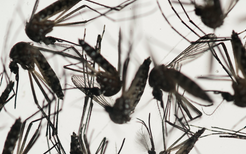BERLIN -- The World Health Organization said there is "no public health justification" for postponing or canceling the Summer Olympics in Rio de Janeiro because of the Zika outbreak in Brazil.
The assessment, in a statement early Saturday, came a day after 150 health experts issued an open letter to the Geneva-based U.N. health agency calling for the games to be delayed or relocated "in the name of public health."
Friday's letter cited recent scientific evidence that the Zika virus causes severe birth defects, most notably babies born with abnormally small heads. In adults, it can cause neurological problems, including a rare syndrome that can be fatal or result in temporary paralysis.
The authors also noted that despite increased efforts to wipe out the mosquitoes that spread Zika, the number of infections in Rio de Janeiro has gone up rather than down.
The experts came from more than two dozen countries in fields including public health, bioethics and pediatrics, and included former White House science adviser Dr. Philip Rubin.
WHO, however, said "based on current assessment, canceling or changing the location of the 2016 Olympics will not significantly alter the international spread of Zika virus."
Several public health academics have warned that having hundreds of thousands of people travel to the Aug. 5-21 games in Brazil will inevitably lead to the births of more brain-damaged babies and speed up the virus' global spread.
But the U.N. health agency argued that Brazil is just one of dozens of countries reporting the transmission of the Zika virus by mosquitoes and said "people continue to travel between these countries and territories for a variety of reasons."
"Based on the current assessment of the Zika virus circulating in almost 60 countries globally and 39 in the Americas, there is no public health justification for postponing or canceling the games," it said. "WHO will continue to monitor the situation and update our advice as necessary."
It pointed to its existing advice urging pregnant women not to travel to areas with Zika virus transmission, among other recommendations.
WHO declared the spread of Zika in the Americas to be a global emergency in February.
One of the Friday letter's authors wasn't impressed by the U.N. agency's arguments.
"The WHO's response is absolutely fanciful," said Amir Attaran, a professor at the University of Ottawa. He called WHO's argument that Zika is already being transmitted by mosquitoes in up to 60 countries "a scientific half-truth."
"They're avoiding the question of 'Is it Brazilian Zika in other countries?'" he said.
Friday's letter pointed to the particularly high risks from the Zika virus strain seen in Brazil, which has by far the most Zika cases in the world and the most brain-damaged Zika babies.
WHO emergency response chief Dr. Bruce Aylward told the BBC that the agency was "maintaining a careful ongoing risk assessment as new information becomes available about this disease."
"We need to do a better job, perhaps, of communicating everything that's being done," he said.
The WHO statement didn't address the concerns in Friday's letter that it was rejecting alternatives to Rio because it had a conflict of interest due to its long relationship with the International Olympic Committee.
The International Olympic Committee rejected the idea that the two organizations were too close, saying it "does not currently have an [memorandum of understanding] with the World Health Organization." The last memorandum, it added, "outlined cooperation between the two organizations to promote physical activity to fight strokes, heart attacks, diabetes and obesity."
Information for this article was contributed by Stephen Wilson and Maria Cheng of The Associated Press.
A Section on 05/29/2016

